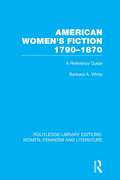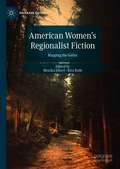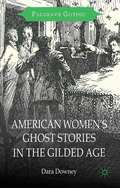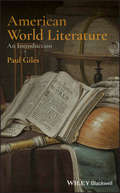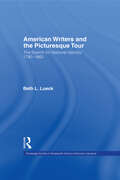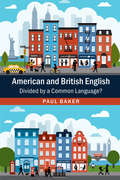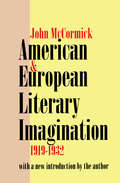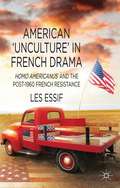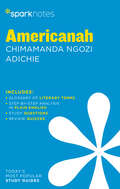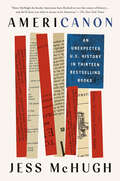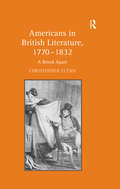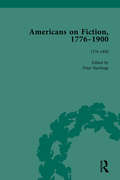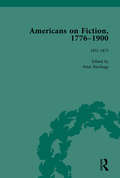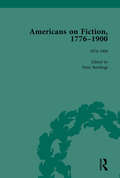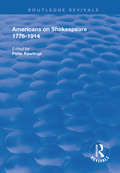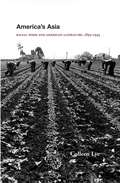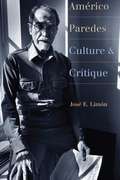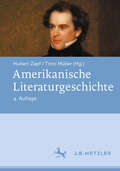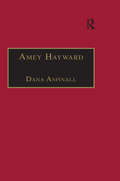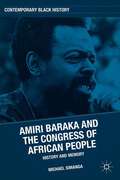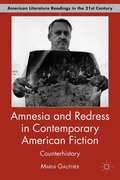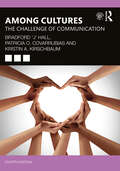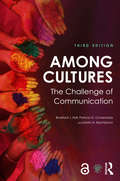- Table View
- List View
American Women's Fiction, 1790-1870: A Reference Guide (Routledge Library Editions: Women, Feminism and Literature)
by Barbara A. WhiteAn annotated bibliography on women who wrote fiction in the US during the period 1790-1870. The first part is an annotated list of sources that discuss women's fiction in the period and women authors born before 1840 who published before 1870. The second part is an alphabetical list of the approximately 325 19th century writers who meet those criteria. There are indexes by pseudonym, editor, and subject. The sources provide information not only about the individual authors but also about the history of criticism and literary politics, especially women's place in the American literary canon.
American Women's Regionalist Fiction: Mapping the Gothic (Palgrave Gothic)
by Monika Elbert Rita BodeAmerican Women’s Regionalist Fiction: Mapping the Gothic seeks to redress the monolithic vision of American Gothic by analyzing the various sectional or regional attempts to Gothicize what is most claustrophobic or peculiar about local history. Since women writers were often relegated to inferior status, it is especially compelling to look at women from the Gothic perspective. The regionalist Gothic develops along the line of difference and not unity—thus emphasizing regional peculiarities or a sense of superiority in terms of regional history, natural landscapes, immigrant customs, folk tales, or idiosyncratic ways. The essays study the uncanny or the haunting quality of “the commonplace,” as Hawthorne would have it in his introduction to The House of the Seven Gables, in regionalist Gothic fiction by a wide range of women writers between ca. 1850 and 1930. This collection seeks to examine how/if the regionalist perspective is small, limited, and stultifying and leads to Gothic moments, or whether the intersection between local and national leads to a clash that is jarring and Gothic in nature.
American Women’s Ghost Stories in the Gilded Age
by Dara DowneyThis book shows just how closely late nineteenth-century American women's ghost stories engaged with objects such as photographs, mourning paraphernalia, wallpaper and humble domestic furniture. Featuring uncanny tales from the big city to the small town and the empty prairie, it offers a new perspective on an old genre.
American World Literature: An Introduction (Textxet: Studies In Comparative Literature Ser. #47)
by Paul GilesA scholarly review of American world literature from early times to the postmodernist era American World Literature: An Introduction explores how the subject of American Literature has evolved from a national into a global phenomenon. As the author, Paul Giles – a noted expert on the topic – explains, today American Literature is understood as engaging with the wider world rather than merely with local or national circumstances. The book offers an examination of these changing conceptions of representation in both a critical and an historical context. The author examines how the perception of American culture has changed significantly over time and how this has been an object of widespread social and political debate. From examples of early American literature to postmodernism, the book charts ways in which the academic subject areas of American Literature and World Literature have converged – and diverged – over the past generations. Written for students of American literature at both undergraduate and postgraduate levels and in all areas of historical specialization, American World Literature offers an authoritative guide to global phenomena of American World literature and how this subject has undergone crucial changes in perception over the past thirty years.
American Writers and the Approach of World War II, 1935-1941
by Ichiro TakayoshiIchiro Takayoshi's book argues that World War II transformed American literary culture. From the mid-1930s to the American entry into World War II in 1941, preeminent figures from Ernest Hemingway to Reinhold Neibuhr responded to the turn of the public's interest from the economic depression at home to the menace of totalitarian systems abroad by producing novels, short stories, plays, poems, and cultural criticism in which they prophesied the coming of a second world war and explored how America could prepare for it. The variety of competing answers offered a rich legacy of idioms, symbols, and standard arguments that was destined to license America's promotion of its values and interests around the world for the rest of the twentieth century. Ambitious in scope and addressing an enormous range of writers, thinkers, and artists, this book is the first to establish the outlines of American culture during this pivotal period.
American Writers and the Picturesque Tour: The Search for National Identity, 1790-1860 (Garland Studies in 19th Century American Literature #Vol. 7)
by Beth L. LueckExplores a beloved genreEven before the age of the Romantics, travel literature was a favorite genre of English and American writers and readers. After the War of 1812, Americans' passion for scenic beauty inspired them to take the picturesque tour of America as well as going to Europe for the requisite Grand Tour. The written American version of the popular British tour in various guidebooks helped shape the literature of the new nation as nearly every major writer of the first half of the 19th century contributed to it from Poe, who provided several comic pieces, and Irving to Thoreau, for whom the tour symbolized moral and spiritual growth, and Margaret Fuller.Offers new perspectivesAmerican writers adapted the picturesque to express their nationalistic sentiments; picturesque discourse offered a flexible series of conventions that enable writers to celebrate the places, people, and legends that set America apart. This volume demonstrates the vital role of this genre in the formation of national literary taste and national culture and offers fresh and exciting perspectives on the topic. Includes index. Also includes maps.
American and British English: Divided by a Common Language?
by Paul BakerIs British English becoming more like American English? If so, why, and in what ways? This book compares examples of American and British language data from the 1930s, 1960s, 1990s and 2000s, to track the most important ways that both varieties are changing over time, and compares the extent to which they are following similar paths using a mixture of computer and human analysis. The analysis is carried out across several levels, including spelling differences (such as colour vs color), vocabulary (truck vs lorry), and a range of morphological, grammatical, semantic and pragmatic features. Baker explores the changing aspects of American and British society which help to explain the findings.
American and European Literary Imagination
by John McCormickWestern culture is composed of a subtle and complex mixture of influences: religious, philosophical, linguistic, political, social, and sociological. American culture is a particular strain, but unless European antecedents and contemporary leanings are duly noted, any resulting history is predestined to provincialism and distortion. In his account of American literature during the period 1919 to 1932, McCormick deals with the extraordinary work of artists who wrested imaginative order from a world in which the abyss was never out of sight.McCormick's volume is intended as a critical, rather than encyclopedic history of literature on both sides of the Atlantic between the end of World War I and the political and social crises that arose in the 1930s. Although he emphasizes American writers, the emergence of a vital and distinctly modern American literature is located in the cultural encounter with Europe and the rejection of national bias by the major figures of the period.McCormick deals with Gertrude Stein and the mythology of the "lost generation," the tensions and ambivalences of traditionalism and modernity in the work of Sherwood Anderson and F. Scott Fitzgerald, the effect and qualities of Hemingway's style as compared to that of Henry de Montherlant, and the provincial iconoclasm of Sinclair Lewis juxtaposed with the more telling satire of Italo Svevo. The formal innovations in the work of John Dos Passos, E.E. Cummings, and William Faulkner, the poetic revolution against cultural parochialism and genteel romanticism is given extensive consideration with regard to the work of T.S. Eliot, Ezra Pound, Wallace Stevens, William Carlos Williams, and Marianne Moore are also discussed. The concluding chapters discuss literary and social criticism and assess the influence of psychoanalysis, philosophical pragmatism, and radical historiography on the intellectual climate of the period.Teachers and students in English and American Literature, American History, and Comparative Literature, and the general reader interested in the writing of the period, may gain new insights from these valuations, devaluations, and re-evaluations.
American ‘Unculture’ in French Drama
by Les EssifA book about the role America plays in the French imagination, as it translates to the French stage. Informed by a rich variety of Western cultural scholarship, Essif examines two dozen post-1960 works representing some of the most innovative dramaturgy of the last half century, including works by Gatti, Obaldia, Cixous, Koltes, and Vinaver.
Americanah SparkNotes Literature Guide (SparkNotes Literature Guide Series)
by SparkNotesCreated by Harvard students for students everywhere, SparkNotes give you just what you need to succeed in school: Complete Plot Summary and AnalysisKey Facts About the WorkAnalysis of Major CharactersThemes, Motifs, and SymbolsExplanation of Important QuotationsAuthor&’s Historical ContextSuggested Essay Topics25-Question Review QuizAmericanah features explanations of key themes, motifs, and symbols including: the importance of authenticity; race and racism; the male peacock; reading and novels; lies; hair. It also includes detailed analysis of these important characters: Ifemelu; Obinze; Dike; Aunty Uju.
Americanon: An Unexpected U.S. History in Thirteen Bestselling Books
by Jess McHugh&“An elegant, meticulously-researched and eminently readable history of the books that define us as Americans. For history buffs and book-lovers alike, McHugh offers us a precious gift.&”—Jake Halpern, Pulitzer Prize Winner and New York Times Bestselling author &“With her usual eye for detail and knack for smart storytelling, Jess McHugh takes a savvy and sensitive look at the 'secret origins' of the books that made and defined us…. You won't want to miss a one moment of it.&”—Brian Jay Jones, author of Becoming Dr. Seuss and the New York Times Bestselling Jim HensonThe true, fascinating, and remarkable history of thirteen books that defined a nation. Surprising and delightfully engrossing, Americanon explores the true history of thirteen of the nation&’s most popular books. Overlooked for centuries, our simple dictionaries, spellers, almanacs, and how-to manuals are the unexamined touchstones for American cultures and customs. These books sold tens of millions of copies and set out specific archetypes for the ideal American, from the self-made entrepreneur to the humble farmer. Benjamin Franklin&’s Autobiography, How to Win Friends and Influence People, Webster's Dictionary, Emily Post&’s Etiquette: Americanon looks at how these ubiquitous books have updated and reemphasized potent American ideals—about meritocracy, patriotism, or individualism—at crucial moments in history. Old favorites like the Old Farmer&’s Almanac and Betty Crocker&’s Picture Cook Book are seen in this new way—not just as popular books but as foundational texts that shaped our understanding of the American story. Taken together, these books help us understand how their authors, most of them part of a powerful minority, attempted to construct meaning for the majority. Their beliefs and quirks—as well as personal interests, prejudices, and often strange personalities—informed the values and habits of millions of Americans, woven into our cultural DNA over generations of reading and dog-earing. Yet their influence remains uninvestigated. Until now. What better way to understand a people than to look at the books they consumed most, the ones they returned to repeatedly, with questions about everything from spelling to social mobility to sex? This fresh and engaging book is American history as you&’ve never encountered it before.
Americans Today and Yesterday (Reach Into Phonics Ser.)
by Deborah J. Short Imogene Cole Sky BarkerNIMAC-sourced textbook
Americans in British Literature, 1770–1832: A Breed Apart
by Christopher FlynnAmerican independence was inevitable by 1780, but British writers spent the several decades following the American Revolution transforming their former colonists into something other than estranged British subjects. Christopher Flynn's engaging and timely book systematically examines for the first time the ways in which British writers depicted America and Americans in the decades immediately following the revolutionary war. Flynn documents the evolution of what he regards as an essentially anthropological, if also in some ways familial, interest in the former colonies and their citizens on the part of British writers. Whether Americans are idealized as the embodiments of sincerity and virtue or anathematized as intolerable and ungrateful louts, Flynn argues that the intervals between the acts of observing and writing, and between writing and reading, have the effect of distancing Britain and America temporally as well as geographically. Flynn examines a range of canonical and noncanonical works-sentimental novels of the 1780s and 1790s, prose and poetry by Wollstonecraft, Blake, Coleridge, and Wordsworth; and novels and travel accounts by Smollett, Lennox, Frances Trollope, and Basil Hall. Together, they offer a complex and revealing portrait of Americans as a breed apart, which still resonates today.
Americans on Fiction, 1776-1900 Volume 1
by Peter RawlingsA collection of prefaces, reviews and articles by Americans on American and European fiction. Charted in these three volumes, which span 1776 to 1900, is the movement from anxious defences of the novel as a necessary vehicle of truth and morality to fully-fledged theoretical exfoliations.
Americans on Fiction, 1776-1900 Volume 2
by Peter RawlingsA collection of prefaces, reviews and articles by Americans on American and European fiction. Charted in these three volumes, which span 1776 to 1900, is the movement from anxious defences of the novel as a necessary vehicle of truth and morality to fully-fledged theoretical exfoliations.
Americans on Fiction, 1776-1900 Volume 3
by Peter RawlingsA collection of prefaces, reviews and articles by Americans on American and European fiction. Charted in these three volumes, which span 1776 to 1900, is the movement from anxious defences of the novel as a necessary vehicle of truth and morality to fully-fledged theoretical exfoliations.
Americans on Shakespeare, 1776-1914 (Routledge Revivals)
by Peter RawlingsPublished in 1999. Shakespeare is ‘the great author of America’ declared James Fenimore Cooper in 1828. The ambiguous resonance of this claim is fully borne out in this collection of writings on Shakespeare by over forty prominent Americans, spanning the period between the War of independence and the outbreak of the First World War. Featured writers include: Ralph Waldo Emerson, Edgar Allen Poe, Herman Melville, Nathaniel Hawthorne, Abraham Lincoln, Walt Whitman and Mark Twain. The essays, many of which are reprinted here for the first time, are arranged in chronological order and provide a fascinating conspectus of American attitudes to Shakespeare, from Revolutionary and Transcendentalist approaches through to the influential interventions of professional American critics in the early twentieth century. The extraordinary and bizarre contribution to the Shakespeare debut by Delia Bacon is exemplified by the inclusion of her 1856 article which is reprinted in its entirety. Americans on Shakespeare charts the emergence of an American literary tradition, and the gradual appropriation of Shakespeare as part of the American search for cultural identity; an identity whose domination is set to continue into the twenty-first century.
America’s Asia: Racial Form and American Literature, 1893-1945
by Colleen LyeWhat explains the perception of Asians both as economic exemplars and as threats?America's Asia explores a discursive tradition that affiliates the East with modern efficiency, in contrast to more familiar primitivist forms of Orientalism. Colleen Lye traces the American stereotype of Asians as a "model minority" or a "yellow peril"--two aspects of what she calls "Asiatic racial form"-- to emergent responses to globalization beginning in California in the late nineteenth century, when industrialization proceeded in tandem with the nation's neocolonial expansion beyond its continental frontier. From Progressive efforts to regulate corporate monopoly to New Deal contentions with the crisis of the Great Depression, a particular racial mode of social redress explains why turn-of-the-century radicals and reformers united around Asian exclusion and why Japanese American internment during World War II was a liberal initiative. In Lye's reconstructed archive of Asian American racialization, literary naturalism and its conventions of representing capitalist abstraction provide key historiographical evidence. Arguing for the profound influence of literature on policymaking, America's Asia examines the relationship between Jack London and leading Progressive George Kennan on U. S. -Japan relations, Frank Norris and AFL leader Samuel Gompers on cheap immigrant labor, Pearl S. Buck and journalist Edgar Snow on the Popular Front in China, and John Steinbeck and left intellectual Carey McWilliams on Japanese American internment. Lye's materialist approach to the construction of race succeeds in locating racialization as part of a wider ideological pattern and in distinguishing between its different, and sometimes opposing, historical effects.
Americo Paredes: Culture and Critique
by Jose E. LimonSeveral biographies of Américo Paredes have been published over the last decade, yet they generally overlook the paradoxical nature of his life's work. Embarking on an in-depth, critical exploration of the significant body of work produced by Paredes, José E. Limón (one of Paredes's students and now himself one of the world's leading scholars in Mexican American studies) puts the spotlight on Paredes as a scholar/citizen who bridged multiple arenas of Mexican American cultural life during a time of intense social change and cultural renaissance. Serving as a counterpoint to hagiographic commentaries, Américo Paredes challenges and corrects prevailing readings by contemporary critics of Paredes's Asian period and of such works as the novel George Washington Gómez, illuminating new facets in Paredes's role as a folklorist and public intellectual. Limón also explores how the field of cultural studies has drifted away from folklore, or "the poetics of everyday life," while he examines the traits of Mexican American expressive culture. He also investigates the scholarly paradigm of ethnography itself, a stimulating inquiry that enhances readings of Paredes's best-known study, "With His Pistol in His Hand," and other works. Underscoring Paredes's place in folklore and Mexican American literary production, the book questions the shifting reception of Paredes throughout his academic career, ultimately providing a deep hermeneutics of widely varied work. Offering new conceptions, interpretations, and perspectives, Américo Paredes gives this pivotal literary figure and his legacy the critical analysis they deserve.
Amerikanische Literaturgeschichte
by Hubert Zapf Timo MüllerIn der 4. Auflage ist das Buch umfassend neu konzipiert worden. Neben den Kapiteln von den Puritanern bis zur Postmoderne, die als Klassiker in der Amerikanistik gelten und nur wenig verändert beibehalten werden, sind alle anderen Kapitel entweder neu geschrieben oder stark revidiert worden. Die ausführlichen Porträts der indigenen und der Latino/a-Literatur, der afro- und asiatisch-amerikanischen Literatur tragen der ausgeprägten Diversität der literarischen Kultur der USA Rechnung. Kernstück ist ein ganz neu verfasstes, umfangreiches Kapitel zur Literatur der Gegenwart.
Amey Hayward: Printed Writings 1641–1700: Series II, Part Two, Volume 4 (The Early Modern Englishwoman: A Facsimile Library of Essential Works & Printed Writings, 1641-1700: Series II, Part Two #Pt. 2)
by Dana AspinallThe Females Legacy is the only surviving work of Amey Howard about whom very little is known. While rarely political or even topical, The Females Legacy generally conforms to much of the same militantly Protestant ideology of the sort Harris spent his life advocating. The volume contains twenty-six devotional poems nearly all of which feature a male speaker. Some are 'meditations' in which the speaker considers the import of an Old or New Testament narrative. Others are 'dialogues' between speakers who grapple with a sudden realisation of their own sinful natures and a biblical figure who introduces them to Christ's redemptive majesty. Interspersed amongst these two kinds of verse are a few other poems which directly address women or deploy them as protagonists. This edition reproduces the sole surviving copy of The Females Legacy held in the British Library.
Amiri Baraka and the Congress of African People
by Michael SimangaThis important look at CAP combines historical research and analysis with the author's first-hand experience with the organization, providing the first historical narrative of a consequential player in the Black Power Movement.
Amnesia and Redress in Contemporary American Fiction
by Marni GauthierThis book shows how a political and cultural dynamic of amnesia and truth telling shapes literary constructions of history. Gauthier focuses on the works ofDon DeLillo, Toni Morrison, Michelle Cliff, Bharati Mukherjee, and Julie Otsuka. "
Among Cultures: The Challenge of Communication
by Kristin A. Kirschbaum Patricia O. Covarrubias Bradford 'J' HallThrough its unique approach of using narratives and stories to convey theories and concepts, this text, now in its fourth edition, gives students a foundational knowledge in intercultural communication that is imperative for understanding and navigating our increasingly complex human interactions. This edition continues with an interpretive approach to intercultural communication that is dedicated to providing resources to understand and explain how our own and other cultural systems are reasonable and valuable. New to this edition are increased explorations of immigration, intersectionality, and privilege. For greater flexibility, it introduces a series of mini chapters on topics such as globalization (including discussion of the impact of new media and popular culture), education, and the role of culture in family communication, health communication, environmental communication and multicultural leadership. Each chapter again closes with a summary, reflection questions, and suggestions for activities available for students’ own review or as potential class exercises. The book is an ideal companion for introductory or upper-level undergraduate courses in intercultural communication. Online resources include self-tests, enrichment activities, reflection questions, recommendations for addition readings for students, lecture slides, chapter objectives, supplemental readings, sample discussion and test questions, and additional classroom activities for instructors. Please visit www.routledge.com/cw/hall.
Among Cultures: The Challenge of Communication
by Bradford J. Hall Kristin A. Kirschbaum Patricia O. CovarrubiasAmong Cultures: The Challenge of Communication, Third Edition explores intercultural communication and the relationship between communication and culture, using narrative as a common and compelling thread for studying intercultural interactions. Anchored in the position that people make sense of their worlds through choosing and telling narratives to themselves and others, this text is replete with narratives and stories. Chapters address key aspects of intercultural communication, including verbal and nonverbal communication; stereotypes and bias; identity; conflict; diversity; and ethics. Using an interpretive approach to intercultural communication, the text helps students understand that although a person may appear different, his/her common sense is quite reasonable within a particular interpretive context. Resources are included to help students understand and explain the reasonableness of other cultural systems. The text includes activities for students to complete while reading, including self-assessments and nonverbal self-knowledge tests. Reflection questions within and at the end of each chapter promote thinking and discussion on each topic. With its unique approach to studying intercultural communication via real-life narratives, this text facilitates a deep understanding of the cultural aspects of communication. In providing the narratives of others, it encourages students to tell their own stories and build a strong foundation for communicating across cultures. New to the Third Edition: New chapter—"What Role Does Culture Play in Contemporary Contexts?"—explores intercultural communication as it relates to the environment, health, and technology. New sections on identity, silence, and terms of address as important communicative practices in intercultural settings. Updated sections on honorifics, key terms, social dramas and the golden approaches to ethics.
